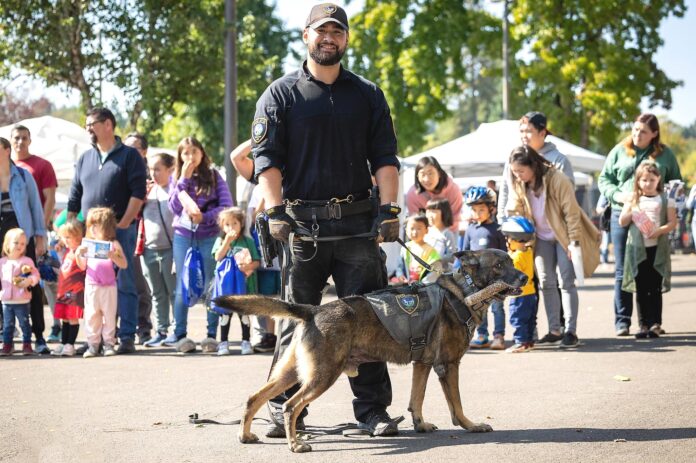City Council gave the green light to a public safety renewal levy for the May ballot, asking voters to maintain funding for additional officers and training provided by the original measure.
The current five-year tax, approved in 2020 and set to expire in 2025, generates about $10.6 million over its lifetime, funds that were earmarked for nine new positions and providing de-escalation crisis intervention training to all sworn officers.
Tigard police spokesperson Kelsey Anderson said the department had hired all eight new patrol officers and the school resource officer afforded by the levy, but with the natural fluidity of employee turnover, two positions currently need filling.
“(The additional hires) really just bridge a critical gap. It’s not dream staffing levels,” Anderson said of the levy-funded additions. “It’s just critical staffing numbers.”
About three to five officers are on patrol in the city at any given time, she said.
A successful renewal would generate about $13.5 million between 2025 and 2030.
The levy rate of 29 cents per $1,000 of assessed property value would not create an additional tax, which city staff say is key to garnering support for the ask.
In a series of community polls conducted over several months, support jumped substantially when wording emphasized the measure won’t cost homeowners more than they’re currently paying.
“With intentional messaging, we see support for the renewal levy at 68 percent,” assistant city manager Cathy Nyland reported to Council at a Feb. 13 meeting. “By reminding participants (in a series of polls) that a renewal would not increase taxes, support grew from 52 percent to 68 percent.”
The cost for a typical Tigard home with an assessed value of $318,440 would be $92.35 annually, about $7.70 a month. Because the formula is based on assessed values, not market values, rates may rise slightly from year to year but are insulated from big shifts in the housing market.
Yearly estimated revenues rise from about $2.5 million in 2025 to $2.9 million in 2030, with the funds generated growing by about $100,000 each year.
According to Anderson, asking for a renewal has been the plan since the levy’s inception. Without it, the department would need to cut the positions, or the city would need to find funding in other places to cover the salaries.
The levy additionally funds de-escalation and crisis intervention training.
Of the department’s 71 sworn officers, 31 have completed it, with another four scheduled to take the class in April.
From its inception to the end of the 2023 fiscal year, it generated $6.5 million, during which time the city spent $5 million on levy-related costs. Anderson attributes the multiple factors, including lower-than-expected training costs.
“Expenditures were somewhat lower than originally budgeted, particularly in our first year, due to obstacles related to recruiting during the pandemic,” she said. “Additionally, the City structured the levy to build a fund balance in the first few years in order to support increased costs during the renewal period.”
The balance remains in a special levy revenue fund that can be tapped to help cover rising future expenses like cost-of-living salary increases and inflationary costs associated with increased costs such as fuel, equipment, training, and general supplies.
The city is conducting an ongoing, multipronged outreach campaign with newspaper ads, newsletters, and utility bill inserts to raise voter awareness before the May primary. In a September poll that reached 400 registered Tigard voters, 55 percent said they plan to vote.
In the same poll, Democrats and POC voters emerged as the strongest levy proponents while support among registered Republicans dropped, Nyland told the Council during its Feb. 13 meeting.
During the Feb. 13 meeting, Councilor Jai Raj Singh questioned the survey interpretation, saying the structure hid the less favorable perspective of black respondents.
“In the Jan 2024 police levy survey section, it looks like eight black community members were surveyed out of 400. Of those who said they would vote, half and almost a majority indicated they would vote no on the police levy, whereas a majority of people who identified as Asian and Hispanic said that they would vote “yes,” he said. Based on this data, lumping POC together on this issue really distorts the reality.”
He additionally questioned the price tag of Tigard’s outreach and promotion campaign.
“We’re tracking funding, and it hasn’t been much, to be honest,” Nyland said, noting the city devoted more money and staff time to the initial 2020 ask.
When the levy moves to the ballot, the city shifts from advocacy to neutrality, she said.






















